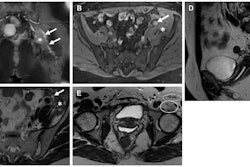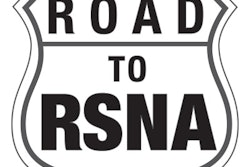
Sunday, December 1 | 10:55 a.m.-11:05 a.m. | SSA10-02 | Room N228
Researchers from Massachusetts will describe how the combination of structured reporting and reader expertise can improve the diagnosis and staging of endometriosis on MRI.Endometriosis is one of the most common and burdening chronic gynecologic diseases, and research has shown that as many as 6 in 10 cases can go undiagnosed in routine clinical care, according to Dr. Adrian Jaramillo-Cardoso of Harvard University in Boston. What's more, many women experience recurrences even after laparoscopic treatment.
The role of imaging in these patients is expanding, with MRI providing vital information in surgical planning and appropriate patient consent, Jaramillo-Cardoso told AuntMinnie.com. In their study, the researchers sought to understand the current gaps in imaging in a real clinical setting by comparing the diagnostic yield for presurgical pelvic MRI scans with three different review methods: routine, structured, and expert review.
"Structured reporting and expert review have both shown benefits in the diagnosis of complicated abdominal and pelvic diseases," Jaramillo-Cardoso said. "Thus, our project set out to query the added value of expert review and structured reporting in the diagnosis and staging of endometriosis."
The researchers learned that using a structured reporting template and expert structured review of pelvic MRI scans both improved sensitivity for endometriosis. They also concluded that reader expertise increases sensitivity and specificity.
"These results prompt an increased role of radiologists in decision-making in the management of patients with endometriosis," Jaramillo-Cardoso said. "Additionally, this study underscores the importance of presurgical imaging, namely MRI, in enhancing the information available to physicians and patients before laparoscopy. This latter issue is of high importance, considering the possible reluctance of surgeons to request MRIs in these patients."
What else did they find? Check out this Sunday morning talk to learn more.
This paper received a Roadie 2019 award for the most popular abstract by page views in this Road to RSNA section.




















